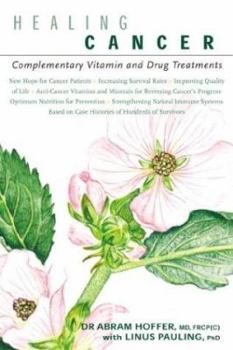Healing Cancer: Complementary Vitamin & Drug Treatments
Select Format
Select Condition 
Book Overview
Written with Linus Pauling, Dr Hoffer shows that megadoses of vitamin C and other nutrients are effective for reversing the progress of various cancers and improving quality of life. This description may be from another edition of this product.
Format:Paperback
Language:English
ISBN:1897025114
ISBN13:9781897025116
Release Date:January 2004
Publisher:Ccnm Press
Length:227 Pages
Weight:1.20 lbs.
Dimensions:0.6" x 6.3" x 9.0"
Customer Reviews
1 rating
Much more than just hope: Hoffer's cancer book is practical and thorough
Published by Thriftbooks.com User , 15 years ago
Healing Cancer: Complementary Vitamin and Drug Treatments by Abram Hoffer with Linus Pauling CCNM Press, 2004. Previously published as Vitamin C and Cancer: Discovery, Recovery, Controversy. Quarry Press, 1999.) Reviewed by Andrew W. Saul, Assistant Editor, Journal of Orthomolecular Medicine Cancer may be humanity's most feared disease, and with reason. Healing Cancer: Complementary Vitamin and Drug Treatments, by Abram Hoffer and Linus Pauling, removes much of that fear, replacing it with clinically-tested practical nutrition. The book provides dozens of documented case histories of vitamin-taking patients who achieved significantly longer life, and vastly improved quality of life. It is unethical to deny therapy that might be of value to the patient. Yet some politically powerful medical authorities continue to openly discourage cancer patients from taking large doses of vitamins. The number of cancer patients who have ever had their doctor recommend a therapeutic trial of large quantities of nutrients remains small. Says Dr. Hoffer: "Fixed ideas about the supposed `evils' of vitamin antioxidants must be one of oncology's most pervasive delusions." The grounds for disparaging vitamins usually center on three inaccurate claims: 1) vitamins are ineffective against cancer; 2) vitamins interfere with conventional cancer therapies, especially chemotherapy; and 3) high doses of vitamins are directly harmful to the cancer patient. It is time to set the record straight. 1) Controlled studies that demonstrate that vitamin C is indeed effective against cancer. Research done in Japan used over 30,000 mg of vitamin C a day. Research conducted by Dr. Hugh Riordan's team in Wichita, Kansas, used as much as 100,000 mg/day. And although focusing on vitamin C, Hoffer and Pauling discuss the value of other nutrients including niacin, the carotenoids, selenium, zinc, and more. 2) Vitamins, especially vitamin C, reduce the side-effects of surgery, chemotherapy, and radiation therapy. The risk reduction aspects of enhanced nutrition, both pre- and post-op, are well established, and supplemented patients have faster, uncomplicated healing after surgery. Patients on a strong nutritional program have far less nausea, and often experience little or no hair loss during chemo. They experience reduced pain and swelling following radiation. Such vitamin-mediated benefits mean that oncologists can give vitamin-taking patients the full treatment, rather than having to cut the dose to keep the patient from giving up entirely. Full-strength chemo is more likely to be effective against cancer than reduced-strength chemo. A similar benefit is at work with radiation therapy: the full intensity of treatment is far better tolerated by an optimally-nourished patient. Perhaps most importantly of all, the authors assert that "Vitamin C increases the killing effect of irradiation and chemotherapy." Clearly vitamins, far from being detrimental, can make a most positive cont





